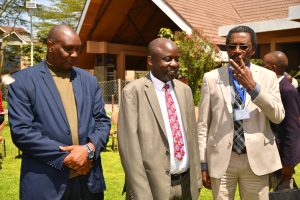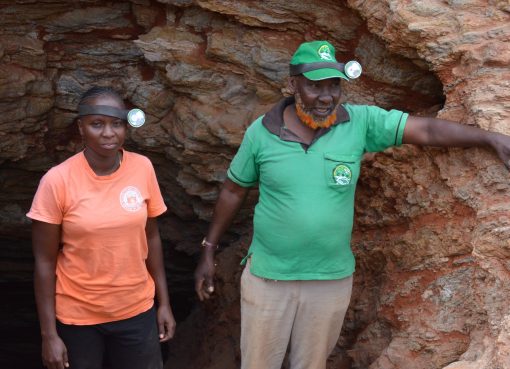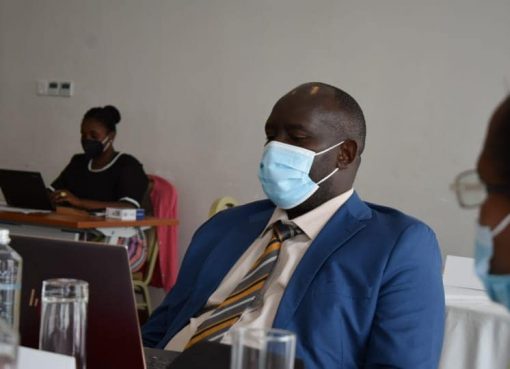An estimated 8.9 million livestock, 2.5 million of them from Kenya, were lost in the greater Horn of Africa alone during the recent drought that ravaged the region for nearly two years, occasioning massive losses to the affected countries totaling about Sh70 billion.
The African Union-Inter African Bureau for Animal Resources (AU-IBAR) Acting Director, Dr. Nick Nwankpa, said this resulted in significant losses of livestock, eroded livelihoods, increased prices of essential livestock-sourced foods, and exposed vulnerabilities in the African feed and fodder input as well as supply chains.
“Feed constitutes 60 to 70 percent of the total cost of animal production; hence, the crises have exposed the significant weaknesses and vulnerabilities in the African feed and fodder input and supply chains; thus, addressing feed and fodder shortages in the short term protects livelihoods,” he said.
Dr. Nwankpa noted that huge genetic resources developed over decades, key to adaptation to climate change and for livelihoods and incomes, especially among pastoralists and animal holders, who produce over 80 to 90 percent of meat and milk, were lost during the drought.
The Ag. Director’s remarks were contained in a speech read on his behalf by the African Union-Inter African Bureau for Animal Resources (AU-IBAR) Senior Projects and Programmes Officer, Dr. Annie Lewa, in Naivasha on Monday, during Resilient African Feed and Fodder Systems Stakeholder (RAFFS) Initiation and Consultative Workshop, which brings together key stakeholders from the African continent such as Cameroun, Kenya, Nigeria, Somalia, Uganda and Zimbabwe.
The five-day workshop seeks to provide a platform for stakeholders to collaborate and chart a path forward towards building resilient African feed and fodder systems and is the first stakeholder engagement in relation to this new AU-IBAR Project.
The RAFFS Project is a collaborative effort to address the adverse effects of recent global crises, the triple C’s: COVID-19, Climate change shocks, and the Conflict between Russia and Ukraine, on African feed and fodder systems.
The AU-IBAR Acting Director, however, said the adverse impacts of the triple C crises on the feed and fodder sector are evident across Africa, given the resource limits, adding that the Proposed Action of the project will focus on highly affected regions and work with six African Union Member States, where livestock has a high contribution to livelihoods, incomes and the economy and where coordinated action and substantive investment can be quickly mobilised to respond to the shortages.

“The multiplicity and increasing frequency and severity of shocks and their complex and interlocking effects demand an approach that will also strengthen resilience in feed and fodder systems,” he said.
Nwankpa also observed that the action proposes strengthening analytical capacity for evidence-based decision-making and attracting investment, identifying and upscaling viable existing approaches and innovative models, and harnessing partnerships for coordinated action to galvanise impactful immediate and short-term investments.
Dr. Nwankpa further stated that women, who are largely rural-based or in the informal sector, are disproportionately poor and vulnerable to the increased prices and unavailability of livestock-sourced foods.
To this end, working through the African Women in Animal Resources Farming and Agribusiness Network, established under the ambit of AU-IBAR, the action proposes interventions to ensure women’s meaningful inclusion in gainful activities in the feed and fodder sector and the livestock-sourced food supply chains.
He said the nature of the feed and fodder sector cuts across borders and has a regional outlook; therefore, coming up with proper feeds, will require concerted and coordinated continental efforts and there are actions in this new project that will require a continental push.
“It is important that we consider how harnessing this Acceleration of the African Continental Free Trade Implementation can provide solutions to this African problem by looking at the opportunities for intra, regional and continental trade in both inputs, feed, and fodder and the opportunities for information, knowledge and technology as well as innovative services and exchanges that can be shared,” he said.
Dr. Nwankpa reminded the member countries that as they draw to the close of the Malabo Declaration on Accelerated Agricultural Growth and Transformation for Shared Prosperity and Improved Livelihoods in 2025, it is now imperative that they prepare to account for how the livestock sector has contributed to delivering against key targets.
The Ag. director observed that currently, only four Member States are on track to deliver key nutrition targets, noting that this is a dire situation for the African continent, with ramifications for the health and capacities of our future generations and for our nations.
She said proper feed and fodder were key to improving the region`s livestock sector.
On her part, Dr. Lewa said the project presents an opportunity for getting new knowledge and innovations for the feed and fodder sector, as it presents an opportunity to look at what innovations can be better utilised to support Livestock Sources Feeds.
At the same time, Dr. Mwenda Mbaka, the Head of the Animal Welfare Docket at AU-IBAR, noting that 70 percent of diseases that affect livestock also attack humans, said there was an urgent need to invest in animal welfare in order to reap maximum benefits from their livestock.
The project’s goal is to understand the impact of these crises on the feed and fodder sector and implement evidence-driven short-term solutions to enhance access to affordable and quality feed, which is critical for sustaining animal-sourced food production.
Further, the project aims to empower women in the feed and fodder sector, support strategic partnerships, attract investment and reform policies and institutions to build a more resilient and sustainable feed and fodder industry.
RAFFS Project is a three-year Emergency/Short-Term Response project jointly funded by the Bill & Melinda Gates Foundation and the African Union Commission, while AU-IBAR is mandated to lead and support livestock development across the continent.
The Project is also designed to stimulate a greater understanding of the impact of the recent and ongoing crises, namely COVID-19, climate change (drought and flooding), and the Russia-Ukraine conflict, on the feed and fodder sector.
By Mabel Keya-Shikuku





